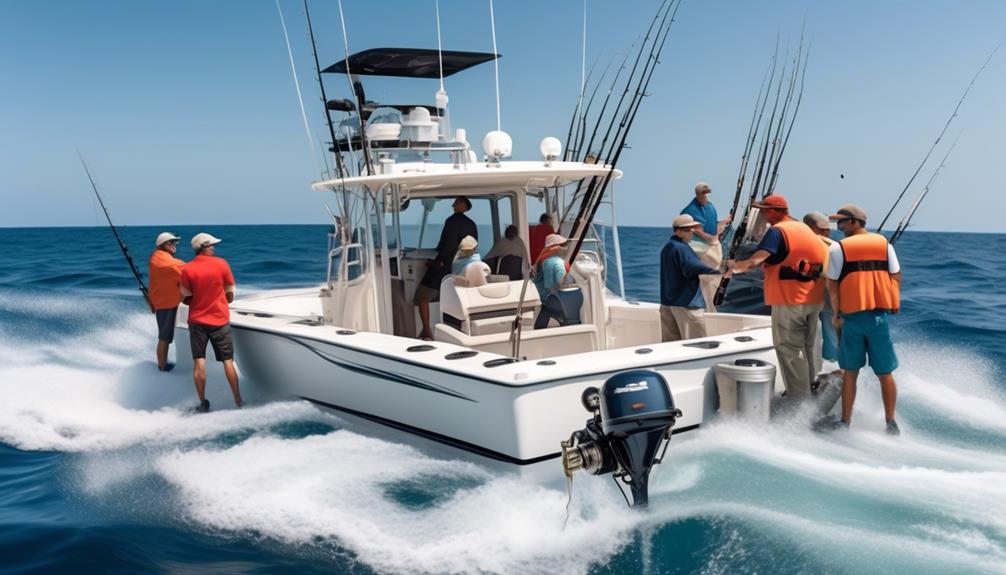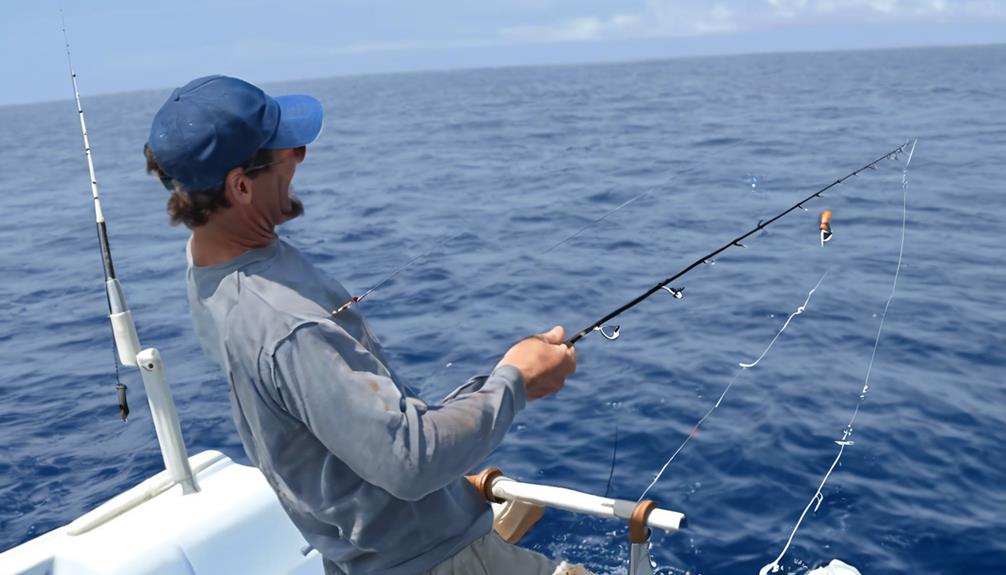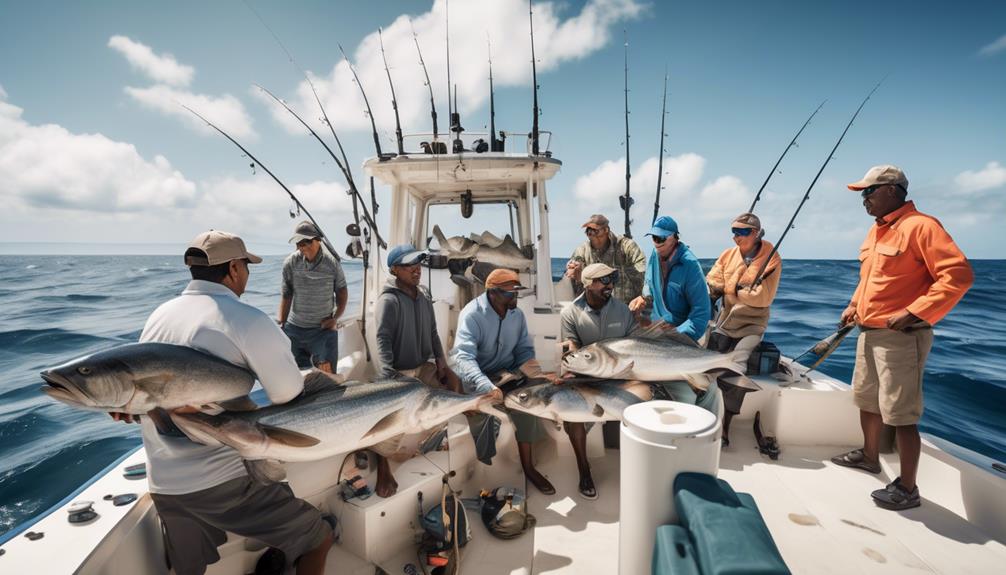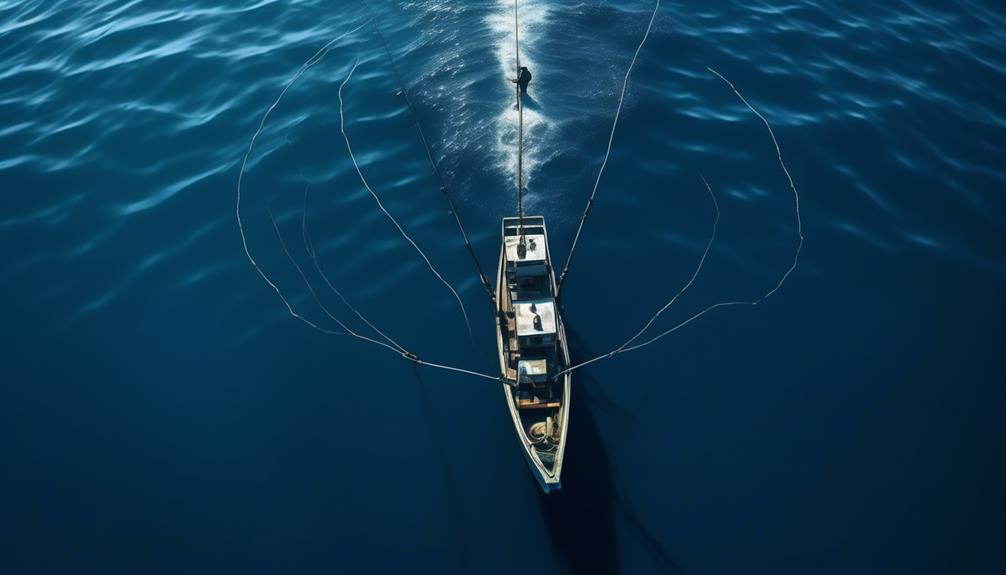You've probably heard the saying, 'It's like fishing in a haystack,' and if you've ever ventured out into the deep sea, you know there's some truth to it. As a beginner, the vastness of the ocean can be both exhilarating and overwhelming. But fear not, because with the right guidance and essential tips, you can navigate these waters with confidence.
Whether you're a seasoned angler looking to expand your horizons or a newbie eager to dive into the world of deep sea fishing, there are key considerations that can make all the difference in your experience. From selecting the proper gear to understanding the intricacies of tides and weather, there's a whole new realm of skills and knowledge waiting to be explored.
So, let's dive in and uncover the essential tips that will set you on the path to deep sea fishing success.
Choosing the Right Gear
When gearing up for deep sea fishing, it's crucial to select the right equipment that matches the type of fish you aim to catch and the conditions of the sea. For rod selection, consider a medium to heavy-duty rod that can handle the weight of larger deep sea fish. Look for a rod with a sensitive tip to detect subtle bites and a strong backbone to handle the fight.
As for reel options, a conventional reel with a high line capacity is ideal for deep sea fishing, allowing you to handle larger fish and withstand the harsh saltwater conditions.
When it comes to tackle choices, make sure to pack a variety of weights, hooks, and leader lines to adapt to different fishing conditions. Carry an assortment of jigs, live bait rigs, and topwater lures to entice a range of deep sea species. Having diverse bait preferences is also crucial. While some deep sea fish are attracted to live bait such as squid, sardines, or mackerel, others may be lured by artificial lures like poppers, jigs, or plugs. It's essential to research the specific fish species you're targeting to determine the most effective bait options.
Selecting the right gear for deep sea fishing is essential for a successful and enjoyable experience. By carefully considering rod selection, reel options, tackle choices, and bait preferences, you can increase your chances of landing that prized deep sea catch.
Understanding Weather and Tides
Understanding the weather patterns and tidal movements is crucial for successful deep sea fishing trips. When planning your deep sea fishing adventure, it's important to consider the impact of ocean currents, tide patterns, and weather forecasting.
Ocean currents play a significant role in the distribution of fish and their prey. By understanding these currents, you can plan your fishing locations more effectively. For example, certain fish species may be more abundant in areas where there's an upwelling of cooler water, bringing nutrients and attracting baitfish.
Tide patterns also greatly influence fish behavior and feeding habits. Fish are often more active during tidal changes, such as incoming or outgoing tides. As a beginner, it's beneficial to familiarize yourself with tide charts for your fishing location to optimize your fishing times.
Additionally, weather forecasting is essential for ensuring a safe and productive deep sea fishing trip. Being aware of weather conditions such as wind speed, precipitation, and storms can help you plan your trip accordingly and avoid potentially hazardous situations.
Learning Basic Knots and Rigs
To optimize your deep sea fishing experience, mastering basic knots and rigs is essential for securing your bait and catching various fish species that are influenced by the ocean currents and tide patterns. Here are some essential tips to help you learn basic knots and rigs:
- Knot Tying Techniques: Learning a few fundamental knot tying techniques is crucial. Practice sessions to perfect these knots, such as the clinch knot, palomar knot, and improved clinch knot, will significantly enhance your fishing experience.
- Understanding Rigging Setup: Understanding the rigging setup is vital to increase your chances of success. Knowing how to set up rigs for different fishing scenarios and fish species is key.
- Equipment Selection: Choosing the right equipment for rigging, such as swivels, leaders, and hooks, is essential for a successful deep sea fishing trip. Understanding which equipment to use for different types of fish and fishing conditions is crucial.
- Rigging Maintenance: Regularly check and maintain your rigs and knots to ensure they're in optimal condition. This includes inspecting for any wear and tear, retying knots if necessary, and replacing any worn-out equipment.
Mastering Bait and Lure Techniques
Mastering bait and lure techniques is crucial for attracting and enticing your target fish effectively during deep sea fishing expeditions. Tackling techniques play a significant role in determining the success of your fishing trip.
When it comes to bait, understanding the types and how to present them can make a substantial difference. For example, live bait like squid or sardines can be enticing for larger predatory fish, while artificial lures such as poppers or jigs can mimic the movement of injured baitfish, attracting the attention of certain species.
Reeling in and casting out also require specific techniques. When using lures, mastering the art of casting and retrieving is essential. Different lures may require varied casting techniques, such as overhead casting for heavier lures or side-armed casting for lighter ones. Additionally, understanding the speed and rhythm of reeling in the lure can make it more enticing to the fish.
It's vital to match your bait and lure choices with the specific fish species you're targeting. Researching the feeding habits and preferences of the fish you're after can help you choose the most effective bait and lures.
Safety Precautions at Sea
Before embarking on any deep sea fishing trip, prioritize your safety by familiarizing yourself with essential sea precautions and emergency procedures. Deep sea fishing can pose certain risks, but with the right knowledge and preparation, you can ensure a safe and enjoyable experience.
Here are some crucial safety precautions to consider:
- Emergency procedures: Familiarize yourself with the emergency procedures on the boat, including how to use life jackets, fire extinguishers, and emergency communication devices. Knowing how to respond in case of an emergency can make a critical difference in ensuring everyone's safety.
- Communication: Establish clear communication channels with the captain and crew. Understand the signals and protocols for communicating distress or emergencies. Effective communication can help in swiftly addressing any potential issues that may arise during the trip.
- Wildlife encounters: Be aware of potential encounters with wildlife, such as sharks or other large sea creatures. Understand the precautions to take in the event of an unexpected wildlife encounter to ensure safety for both you and the marine animals.
- Navigation: Pay attention to the navigation and understand the boat's route. Knowing the basics of navigation can be helpful in case of any unforeseen circumstances, and it can also enhance your overall understanding and enjoyment of the deep sea fishing experience.
Identifying Fish Species and Regulations
As you navigate the deep sea, understanding the various fish species and the regulations surrounding them is crucial for a successful and responsible fishing experience. Fish identification is essential as it allows you to abide by conservation regulations and contribute to the sustainable management of marine resources. When identifying fish species, look for distinguishing features such as coloration, fin shape, and body markings. It's important to familiarize yourself with the specific characteristics of the fish species you're targeting to ensure accurate identification and compliance with regulations.
Conservation regulations are in place to protect fish populations and their habitats. These regulations may include limits on the size and number of fish you can catch, as well as specific areas where fishing is restricted or prohibited. By understanding and adhering to these regulations, you play a crucial role in preserving the marine ecosystem for future generations of anglers.
Before embarking on a deep-sea fishing excursion, research the specific regulations for the location you plan to fish. You can typically find this information on government websites, at local fishing shops, or by contacting fish and wildlife agencies. Additionally, consider joining fishing communities or forums where experienced anglers can provide valuable insights into fish identification and regulations specific to the area you intend to fish.
Getting Familiar With Boat Etiquette

Familiarize yourself with proper boat etiquette to ensure a smooth and enjoyable deep-sea fishing experience for yourself and fellow anglers. Observing boat etiquette is crucial for everyone's safety and to create a harmonious environment while out on the water.
Here are some essential points to keep in mind:
- Boat Safety: Always follow the captain or crew's instructions regarding safety protocols. This includes wearing a life jacket when required, knowing where emergency equipment is located, and being mindful of potential hazards on the boat.
- Respect Others' Space: Be considerate of other anglers on the boat. Avoid casting your line over someone else's and give fellow anglers ample space to work comfortably.
- Clean Up After Yourself: Keep the boat tidy by disposing of trash in designated receptacles. This helps maintain a pleasant environment for everyone and minimizes the risk of accidents.
- Listen and Learn: Pay attention during safety briefings and listen to any guidelines provided by the crew. Understanding and adhering to these instructions ensures a safe and enjoyable trip for all.
Tips for Handling and Releasing Catch
To ensure the well-being of the fish and contribute to sustainable fishing practices, it's important to handle and release your catch with care. When handling your catch, always wet your hands before touching the fish. This helps protect their delicate skin and slime layer, which is crucial for their health. Additionally, avoid touching their gills or eyes, as these areas are particularly sensitive. If you need to unhook the fish, use a proper tool like a de-hooker to minimize handling time and avoid causing unnecessary stress.
When releasing the fish, it's crucial to do so in a manner that maximizes their chances of survival. Support the fish in the water until it can swim away on its own. This may involve gently moving it back and forth in the water to ensure water flow over its gills. If the fish appears lethargic, you can hold it upright, facing into the current, until it gathers enough strength to swim away. Avoid releasing the fish in turbulent waters or near structures that could impede its escape.
These handling techniques and ethical practices are essential for minimizing the impact of catch-and-release fishing on fish populations.
Frequently Asked Questions
How Can Beginners Find the Best Deep Sea Fishing Spots?
You can find the best deep sea fishing spots by researching locations with good fish populations and using reliable methods. Researching local fishing reports, talking to experienced anglers, and using online resources can help you locate prime fishing spots.
What Are Some Common Mistakes to Avoid When Deep Sea Fishing?
When deep sea fishing, avoiding common mistakes is crucial. Focus on proper technique, like using the right bait and being patient. Avoid overestimating your abilities, neglecting safety measures, and underestimating the power of the ocean.
Are There Any Specific Techniques for Targeting Different Types of Fish While Deep Sea Fishing?
When deep sea fishing, different types of fish require different bait and techniques. Trolling is effective for targeting pelagic species like tuna, while bottom fishing works well for snapper and grouper. Experiment with different methods to find success.
What Are Some Tips for Dealing With Sea Sickness While Out on the Water?
To prevent nausea and motion sickness while out on the water, try keeping your focus on the horizon, staying hydrated, and using motion sickness remedies like ginger or over-the-counter medications for a more comfortable fishing experience.
How Can Beginners Connect With Experienced Deep Sea Fishermen to Learn More About the Sport?
To connect with experienced deep sea fishermen, start by networking at local fishing clubs or online forums. Seek mentorship for learning and guidance. Engaging with seasoned anglers can provide valuable insights and tips for beginners.
Conclusion
Now that you have the essential tips for deep sea fishing, you're ready to hit the open waters with confidence. Remember to choose the right gear, be mindful of weather and tides, and practice your basic knots and rigs.
Always put safety first, respect regulations, and practice proper catch and release techniques. With these tips in mind, you'll be well on your way to a successful and enjoyable deep sea fishing experience.
Happy fishing!



